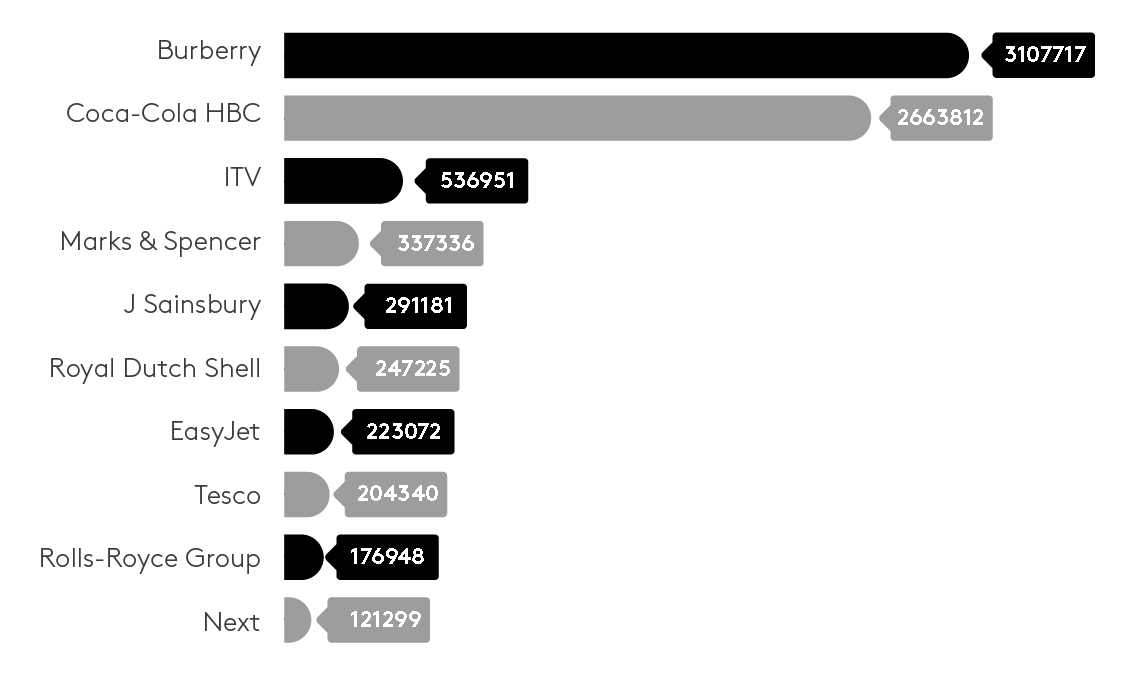 According to Ofcom, social networking is the biggest media activity on the web, so if brands want to be part of today‘s conversations, they can’t afford to be shy of Twitter. Some companies are embracing social media more happily, and successfully, than others. A recent report by communications agency Battenhall, shows which FTSE 100 companies are most active on Twitter, and how this has changed in the last year.
According to Ofcom, social networking is the biggest media activity on the web, so if brands want to be part of today‘s conversations, they can’t afford to be shy of Twitter. Some companies are embracing social media more happily, and successfully, than others. A recent report by communications agency Battenhall, shows which FTSE 100 companies are most active on Twitter, and how this has changed in the last year.
Discussing these changes, Drew Benvie, founder of Battenhall, says: “We have seen some new brands join the million follower club, some gaining over a million followers on their own, and some jumping head first into social media having been silent lurkers this time last year. We have also seen, however, a large amount of resistance to social media still. We put this down to fear of opening up to a social world beyond simply publishing financials.”
The top ten FTSE 100 companies on Twitter, by number of followers:

Generally, the trend has been for FTSE 100 companies to be more visible on Twitter, but this is not without exceptions, and ten companies do not have a Twitter account at all (although there were 12 without a Twitter account last year). The ten brands not on Twitter are: Aberdeen Asset Management, Antofagasta, Ashtead Group, Associated British Foods, Babcock International, Fresnillo, IMI, International Consolidated Airlines Group, Mondi and Randgold Resources, although some of these brands do have staff who are visible on Twitter, including Babcock.
The bottom ten FTSE 100 companies on Twitter, by number of followers:

According to the report, the companies who perform worst on Twitter are GlencoreXstrata, Prudential, BHPBilliton and CRH. The five brands that are growing their brands fastest on Twitter are Burberry Group, ITV, Rolls-Royce Group, Tesco and EasyJet. Benvie says that the companies find it easy to grow their following, so long as they produce good content.
Benvie concludes: “Over time, the trend we are noticing is that social media is a part of the fabric of the mainstream media, and the way it is being used by brands is becoming less driven by marketing campaigns and more by business processes, such as recruitment, customer service and official news publishing. This may not always be on any one medium or social media platform, but each social network has its part to play in the overall evolution of the brand online and offline alike.”
Methodology
The research paper Twitter and the FTSE 100 by Battenhall was compiled September 2014, Twitter data accurate as of 7 September 2014. Where several Twitter accounts exist for one company, the main Twitter account was chosen for inclusion in the research paper. Click here to see the paper.
PR Masterclass: The Intersection of PR and GEO
Join PRmoment for a Masterclass featuring 10 of the industry’s foremost experts. You will walk away with a clear, actionable strategy for adapting your content to an AI-first search environment.
Taking place on Wednesday 25th February in London, both virtual and in person tickets are available.
Early bird ticket sale ends Friday 9 January.
PR MasterclassIf you enjoyed this article, sign up for free to our twice weekly editorial alert.
We have six email alerts in total - covering ESG, internal comms, PR jobs and events. Enter your email address below to find out more:









